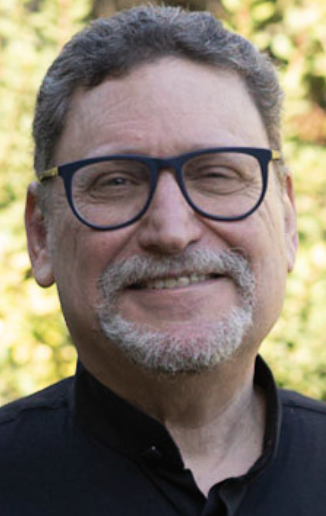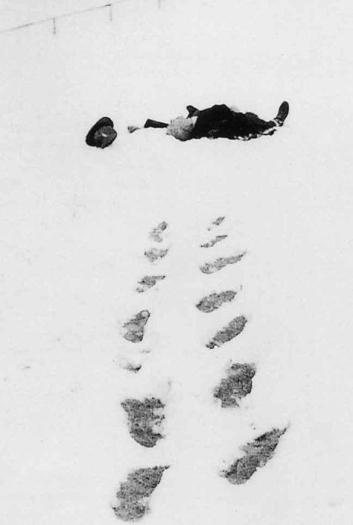
Photo: Nathan Kosta
*****
I began writing regularly forty years ago, in a workshop with Peter Levitt, a Canadian poet, Buddhist teacher, and translator (see his exceptional rendering, with Kazuaki Tanahashi, of The Complete Cold Mountain, from Shambala). I lived alone, taught high school history, and wrote over weekends and summers
In the early 90s, I went to grad school (history again), and started a family. For the next twenty years, that’s where I devoted my time and attention. Then, ten years ago, forced out of my routines by a cluster of losses, I quit full time work and developed a daily writing practice. I wrote Empire of Eden between 2013 and 2018, and, in The High Window’s David Cooke, found a sympathetic, supportive, and energetic publisher.
*****
About these poems:
‘Police Photograph of Robert Walser, Dead’ — My dad’s grandparents were small-town portrait photographers, and my grandparents were handy with a Brownie Box Camera. As a kid, pawing through loose photos and old albums, I’d invent captions and stories. That led, many years later, to Sixty-Three Photographs at the End of a War (3.1 Press, 2021), a photo-essay that takes its title from a handful of snapshots my dad took while arranging for his brother’s body to be shipped back home from a wartime cemetery on the island of Zemami Retto, off Okinawa. ‘Police Photograph’ responds to a well-known snapshot of the Swiss novelist Robert Walser (1878-1956), who died while taking his last morning walk.
‘Flounder’ — I get together weekly to work with a few writerly friends. One of our opening rituals: a ten-minute free-write with the non-dominant hand. Writing with my left hand, even for short periods, is tedious and sometimes painful, but centers my attention on the work before me. The practice has generated a dozen poems which imagine my hands as willful creatures. ‘Flounder’ is one.
Three poems from Empire of Eden (The High Window Press, 2019). My first full-length collection, Empire of Eden reimagines the lives of Eve, Adam, and God (here rendered as Girl, Boy, and The Voice). ‘Climbing the Tree’ is set before the expulsion. ‘The Elder Brother’s Question’ and ‘Cain Remembers the Word’ are set before and after Cain’s murder of Abel.
NB: Copies of are Empire of Eden are available here.
Three poems from Three Hundred Streets of Venice California (due out in 2023 from FutureCycle Press in Athens, Georgia). Since the mid-90s, I’ve lived in Venice, an L.A. beachside suburb best known for its body builders, skateboarders, chainsaw jugglers, artists and writers. The community huffs that history like gasoline fumes. These prose poems offer a counter-myth, grounded in cityscapes and dreamscapes of my morning walks.
Three poems from Star Catalogue, a work in progress. The work starts with a conceit: centuries ago, Earth’s cities took Elon Musk’s advice and departed from a suffering Earth to found “city-planets” scattered across the cosmos. I started the series while clearing photos off my cell phone — rather than deleting the sentimental sunsets and badly-lit nightshots, I went back to my old habit of inventing stories around pictures.
I am grateful to David Cooke for publishing this feature and for all his support and kindness over the past several years. My gratitude as well to those journals in whose pages three of these poems first appeared:
Cleaver, September 2021: ‘Flounder’
Diquieting Muses Quarterly, Fall 2021: ‘Santa Catalina Island Viewed from Venice Beach’
Monday Night, Spring 2021: ‘Barnard Wy’
*****
POLICE PHOTOGRAPH OF ROBERT WALSER DEAD

Bootprints penetrate winter’s white crust. Compressed below, dormant life.
Follow the prints to the body: left arm extended, head bare, hat out of reach.
Between this man and these thirteen steps, an expanse of snow, untouched.
A head-scratcher: how does a body end up so distant from its last bootprint?
The coroner speculates: when the heart seized up, the body leapt high
like a rabbit the eagle is about to catch. A sergeant wonders whether,
having died on its feet, the body, rid of its self, simply floated leaflike
in a low breeze, settling into the snowbank on its own gravity, unaware
that just a moment before, it weighed twelve stone and had somewhere to go.
***
FLOUNDER
i
The fingertips know things. Their ridged
whorls confess the whole body’s
whereabouts.
The fingernails know things too, and knew
them even before the teeth.
ii
The left hand arrives like a visitant, held one
arm’s length from the body. The left is a myth
of repudiated power.
The left hand’s five fingers sense a world
different from the right’s.
The left hand is grafted from another gender,
another species, from that one who knapped
the cleverest edges from flint.
The left hand’s arts are other.
iii
We are not born to symmetry. The mouth
turns up one way or another.
One eye is wayward. The other is clouded.
The heart bleeds left. The liver slumps right.
Joints ache one at a time, sometimes in pain
on the right, sometimes on the left.
We dodder into age and our toes skew.
They’re like a child’s milk teeth, growing
higglety-pigglety.
iv
The flounder’s two moonish eyes have come
to rest on its body’s left side. The flounder’s
right fin has atrophied.
The flounder is the omen of our toppling
bodies.
Catch the flounder. Cut it open. Read that
crooked gut.
Never forget: hold the votive knife in your
left hand’s fist.
***
From EMPIRE OF EDEN
CLIMBING THE TREE
The Voice says, Don’t eat the fruit.
Not a word about climbing the tree.
The two children pull themselves up to the tree’s lowest ledge, finding footholds in the trunk’s jagged wall. The girl stretches one leg, shifts weight to the other, extends a hand to steady her sibling.
Their muscles relax into effort. Gravity, fresh-made, forgives. In this way they climb.
So many creatures, unseen from the ground. The boy and the girl, now experienced namers, dispatch each with a flick of the tongue:
xxxxxxxxxxcapuchin monkey and three-toed sloth
xxxxxxxxxxloris and toucan
xxxxxxxxxxbald-headed eagle
xxxxxxxxxxindiri
xxxxxxxxxxopossum
xxxxxxxxxxmalabar tree toad
Reaching the canopy, the children recline on a meadow of leaf. Nothing obstructs the view. They gaze beyond hedge, beyond river, out to the world’s salt waters.
There’s no reason to fear. The fruit is unpicked, death unchosen.
All afternoon a hawk soars below them. They tell one another:
xxxxxxxxxxWe could jump from this height
xxxxxxxxxxWe could fly like that bird
xxxxxxxxxxOur lives have no end
xxxxxxxxxxWe don’t need wings
*
THE ELDER BROTHER’S QUESTIONS
Cain wonders how his brother can kill what their father has named. He wonders why, before it burns, a gift has to bleed.
He thinks about smoke.
Muscle, wool and bone don’t burn clean. Why not the sweet smoke of straw and stubble? When cut, the stalks don’t shriek.
Why can’t his brother see that? Why can’t his father’s god?
What is so hard for them to understand?
*
CAIN REMEMBERS THE WORD
Cain is shocked. He’s never seen so much blood at once, spoiling the good ground.
Killing was his brother’s way. Crouching just out of sight, Cain had watched the rams struggle and go limp, listening as the Voice praised his brother for the knife’s sharp work.
Should he burn his brother’s body, like his brother burned the ram?
There’s a word Cain’s wanting, a word that makes it right.
The word, he remembers, is sacrifice.
***
From THREE HUNDRED STREETS OF VENICE CALIFORNIA
(forthcoming, FutureCycle Press, 2023)
SANTA CATALINA ISLAND VIEWED FROM VENICE BEACH
1.
Facing Catalina, I hold myself still, as if the island is a small bird that might startle to flight.
Blue and remote, it shares a horizon with the summer-setting moon. Watched for too long, both vanish behind clouds. It’s a fugitive’s habit.
2.
Venice is a pilgrimage site, one that traffics in relics: postcards, t-shirts, an ocean’s blessed water. This summer’s furnace heat — no one expects it. Tourists are sun-smote, their faces sunken and weary.
One woman has her finger behind a sunglass lens, wiping something away: an itch, a lash, a tear. Poor traveler — what brought this on? She turns her head toward the white ocean. Excuse me, she says, is that really an island out there?
3.
Last night’s TV airs hate without interruption, even after I switch it off. Can’t sleep. At sunrise I walk the mile between my bed and the ocean.
There are others here, some walking the tideline, some on their boards in the water. Not even the gulls speak.
To the south, that mountain.
*
BRFENTA PL
A boy, around six, lies on his back on a parkway lawn, his head at the base of a palm. He looks straight up the column and into the fronds.
This is not something his parents have done. This is not something his neighbors have done. No one, as far as he knows, has ever lain flat on the grass and watched a tree being a tree.
What does he see, flat on his back at the age of six?
xxxxxxhe sees the word tall
xxxxxxhe sees the word wind
xxxxxxhe sees the word frond
xxxxxxhe sees the word sky
xxxxxxhe sees the word blue
xxxxxxhe sees the word green
xxxxxxhe sees the word sun
He turns these words round and around, this way and that—
xxxxxxtallxxxxxsky xxx wind
xxxxxxsun xxxgreenxxxblue
xxxxxxwind xxxtallxxx frond
xxxxxxtall xxxxbluexxxx sky
He has just learned to read, sees the words in his head, real as trees. On Brenta Place, this is how life begins: words grown tall from a lawn.
BARNARD WY
Monday Night, Issue 23, Spring 2021.
A neighbor on Barnard asks me: Why write about streets? Why not write about people? It’s like your streets are empty.
My neighbor is right. I sweep my streets clean of crowds. I lock neighbors in their rooms. Not one of these stick figures has a name. Some I call you. Some I call we. Most I call neighbor.
A woman I knew in college smoked clove cigarettes and opened her dorm room to parties. Bowie orbited her turntable.
I couldn’t hear myself think. I sat on the carpet, back to the wall. I stared at her windows, her electrical outlets, the smoke from her ashtrays. Week after week, lost in white noise.
Nothing has changed. I like the lonesome last dark, just before sunrise. I like empty afternoon sidewalks and dark rooms, pensive at night.
I explain to my neighbor: These poems, they’re a little like still-lifes.
My name isn’t neighbor, she says.
***
From THE STAR CATALOGUE, a work in progress
The Star Catalogue: Introduction
The Star Catalogue is intended for all who wish to acquaint themselves, perhaps for the first time, with the Diasporan Cities, their planets, and their star systems.
The story’s broad outlines are well known: as Earth’s climate degraded, astronomers scouted out habitable star systems while engineers designed rockets powerful enough to propel Earth’s greatest cities into the cosmos. In due time, encased within in high-density Pyrex ‘snow-globes,’ the Diasporan Cities blasted off from the home planet and, after long years between star systems, arrived at the very City Planets upon which we now live.
We dedicate this work to the brave souls who undertook the Great Journey, and claimed this, our Galaxy, for all humanity.
— The Authors
NB: To view these poems and images please follow the link: The Star Catalogue
*****
Reblogged this on The Wombwell Rainbow.
LikeLike